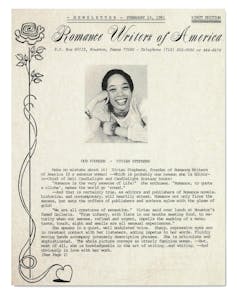
By Christine Larson
The Romance Writers of America, once the world’s largest and most powerful authors’ association, filed for bankruptcy on May 30, 2024.
In its filing, the nonprofit blamed “disputes concerning diversity, equity and inclusion” for its membership declining by a jaw-dropping 80%. With just 2,000 members left, the organization finds itself unable to pay US$3 million in hotel commitments for future conferences.
I’ve spent a decade studying romance publishing, and I believe the rise and fall of the Romance Writers of America shows how quickly organizations can collapse if they don’t serve the needs of all their members.
This debacle could serve as a warning to universities, companies and other groups now abolishing and scaling back inclusion efforts.
A home for struggling writers
In my new book, “Love in the Time of Self-Publishing: How Romance Writers Changed the Rules of Writing and Success,” I show how a decades-long failure to redress institutional racism undermined this once-powerful group.
The Romance Writers of America was founded in 1980 by Vivian Stephens, who was then one of the industry’s only Black editors.

Romantic Times Collection/Browne Popular Culture Library/Bowling Green State University
At the time, romance writers desperately needed an organization. The exploding new genre made millions for publishers, but romance authors themselves were mocked, maligned and mistreated.
The Romance Writers of America changed all that. It provided a professional home where isolated, struggling writers banded together, mentored each other and learned about the industry.
Over four decades, it scored major wins.
Contracts improved. Publishers who didn’t pay were audited and blacklisted. Copyright battles were waged over plagiarism.
The organization also fought to define and limit the fair use of copyrighted material. Along with other authors’ groups, it even stood up to Google – which had been scanning and making books available without authors’ permission – and Amazon, for its overly liberal audiobook return policies.
At its peak in the mid-2010s, the group had some 10,000 members worldwide.
The diversity dilemma
But not all authors benefited equally.
Back then, few editors published the work of writers of color. It’s still an issue today: A 2020 report found that just 8.1% of romance novels from major publishers are written by authors of color.
In the early 1980s, when authors desperately needed the Romance Writers of America, many writers of color kept their complaints to themselves.
But the rise of self-publishing made industry contacts less crucial. Meanwhile, social media offered a powerful megaphone. In 2018, authors of color and their supporters created the hashtag #RitaSoWhite to protest decades of racial exclusion. No Black author had ever won the Romance Writers of America’s coveted – and now no longer offered – RITA award, which was given to the best romance novels of the year in a variety of categories.
The aggrieved authors participated in detailed, extensive social media discussions about the nature of institutional racism in the publishing industry.
In response to these criticisms, many members stepped up to repair the organization. They launched diversity summits with major publishers, created internships and scholarships for marginalized authors, and instituted diversity training for RITA judges.
In 2019, Kennedy Ryan and M. Malone became the first Black authors to win a RITA.
But later that year, a spectacularly mishandled episode prompted mass resignations.
A member filed an ethics complaint against fellow member and diversity advocate Courtney Milan, after Milan called out racist tropes in another member’s book. In response, the Romance Writers of America’s board suspended Milan.
The decision shocked many members, who interpreted the penalty as retaliation for Milan’s diversity activism. Thousands walked. To replace the group’s advocacy role, many romance writers turned to the Authors Guild, whose membership grew 45% in the five years during and after the meltdown.
In filing for bankruptcy, the Romance Writers of America hopes that the financial relief will provide an opportunity to regroup. The organization continues to run programs for some 30 chapters around the country, is launching a new awards program and is advocating for artificial intelligence policies that protect authors.

duluoz cats/flickr, CC BY-NC-ND
Lessons from the fall
This story shows that even powerful, respected groups can unravel practically overnight when diversity, equity and inclusion efforts fall short.
Some lessons can be gleaned from this saga.
For one, the eye of social media, once opened, is unforgiving.
In countless other disputes over four decades, the Romance Writers of America resolved controversies behind closed doors – in meetings, in letters to its in-house magazine and newsletter, and on members-only discussion boards. This protected the organization’s powerful industry reputation. But it also let growing dissatisfaction fester.
Social media pulled back the curtain. And once problems were brought to light, the Twittersphere demanded immediate results. The group had to fix things quickly, with zero room for error.
There were serious missteps aside from the debacle surrounding the ethics complaint.
In 2020, the organization’s in-house magazine featured a tone-deaf cover showing a white writer reaching down to help a Black writer up a mountain. Critics pointed out that the image perpetuated the trope of the white savior. The following year, the group awarded a prize – quickly rescinded – to a book with a protagonist complicit in the genocide of Native Americans.
In each case, social media responded with accelerating, if understandable, fury. Enduring the constant scrutiny of social media, many members working to repair the organization simply gave up.
DEI at a crossroads
An independent audit of the ethics fiasco concluded that the Romance Writers of America relied on a patched-together ethics code and didn’t adequately train its board members. It noted that decisive ethics policies and adequate leadership training could prevent future disasters.
The same can be said of many diversity, equity and inclusion programs: A 2021 study by the Wharton School found that clear policies and involved, well-trained managers were critical to successful DEI initiatives.
Unfortunately, the current anti-DEI movement goes in the opposite direction.
New laws in Texas, Florida and Utah make it illegal for universities to fund DEI efforts. Some 76% of companies have no diversity or inclusion goals at all, according to a 2021 report by the Society of Human Resource Managers. Nearly 70% of companies require no training on inclusion, and most companies are “merely going through the motions” of DEI, it added.
The Romance Writers of America’s bankruptcy shows that laissez-faire attitudes toward diversity and inclusion have long-term consequences.
Underrepresented members and their allies will vote with their feet when diversity efforts fail. It might not happen as abruptly or dramatically as what the Romance Writers of America experienced; it’s certainly easier to quit a professional organization than a job.
But the rise and fall of the group shows that if organizations struggling with full inclusion don’t rewrite their story, their members will do it for them.
![]()
Christine Larson is Assistant Professor of Journalism at the University of Colorado, Boulder





























JimboXYZ says
Romance Novels as a genre pretty much declined into obscurity back when Fabio got too old for the book covers & romance was replaced by the impaired booty call.
protonbeam says
I believe the premise of this is flatly false and uninformed. DEI pandering is precisely the reason this organization failed. No organization can nor should try to be everything to everybody. What it does show is the destructive “agitate, agitate, agaitae” principles and the saul alinsky playbook that is willing to destroy anything and everything in pyrrhic ideological battles. But to a very small segment of the populace, if you don’t succeed, if no one buys your books, if you don’t hit it big..MUST be institutional racism.